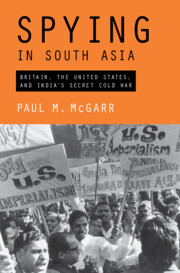6 results

Spying in South Asia
- Britain, the United States, and India's Secret Cold War
-
- Published online:
- 12 September 2024
- Print publication:
- 12 September 2024
1 - Transfer of Power: British Intelligence and the End of Empire in South Asia
-
- Book:
- Spying in South Asia
- Published online:
- 12 September 2024
- Print publication:
- 12 September 2024, pp 14-31
-
- Chapter
- Export citation
3 - India’s Rasputin: V. K. Krishna Menon and the Spectre of Indian Communism
-
- Book:
- Spying in South Asia
- Published online:
- 12 September 2024
- Print publication:
- 12 September 2024, pp 52-75
-
- Chapter
- Export citation
Introduction
-
- Book:
- Spying in South Asia
- Published online:
- 12 September 2024
- Print publication:
- 12 September 2024, pp 1-13
-
- Chapter
- Export citation
2 - Silent Partners: Britain, India, and Early Cold War Intelligence Liaison
-
- Book:
- Spying in South Asia
- Published online:
- 12 September 2024
- Print publication:
- 12 September 2024, pp 32-51
-
- Chapter
- Export citation
20 - ‘September 12 Thinking’
- from Part IV - Thematic Essays
-
-
- Book:
- The Cambridge History of Terrorism
- Published online:
- 07 May 2021
- Print publication:
- 20 May 2021, pp 503-523
-
- Chapter
- Export citation

